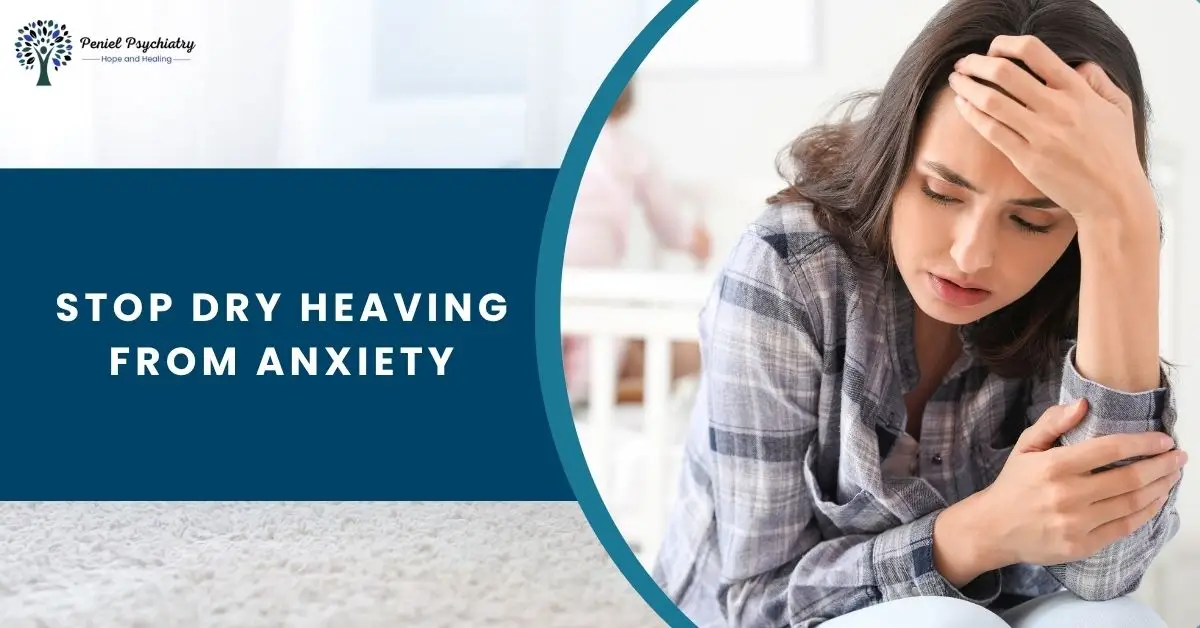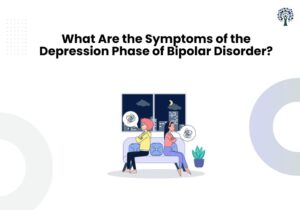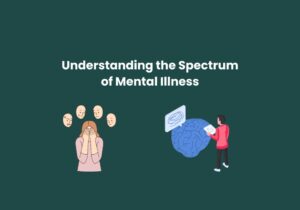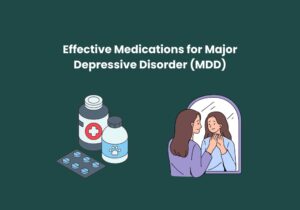How to stop dry heaving from anxiety is something many people want to know, especially when stress hits hard. Dry heaving, or gagging without vomiting, can feel scary and leave you shaken. Anxiety often causes this by tightening your throat or upsetting your stomach.
Some people feel nausea, a gag reflex, or even a choking feeling when panic strikes. The good news is that you can take simple steps to calm your body and stop dry heaving quickly. In this guide, we’ll explore what helps and when to seek medical assistance from a doctor.
What Causes Dry Heaving When You Feel Anxious?
Dry heaving happens when your body tries to vomit, but nothing comes out. It’s a common reaction when anxiety hits. Many people feel gagging or nausea without actually throwing up. Understanding why this happens helps you feel less scared and more in control.
How Triggers Dry Heaving from Anxiety
When you become anxious, your body enters a state of “fight or flight” mode. This causes your muscles to tense up, including those in your stomach and throat. Tight muscles can make you feel like you need to vomit, even if your stomach is empty. That’s why dry heaving often comes with anxiety.
The Role of Your Nervous System
Your nervous system links your brain to your gut. Stress and anxiety send signals that upset your stomach. This can cause nausea and a gag reflex, the feeling that something is stuck or choking you. Sometimes, this nervous stomach reaction happens even if there’s no real reason to vomit.
Why Dry Heaving Feels Worse Than Normal Nausea
Dry heaving can be scary because you feel your body’s strong urge to vomit, but nothing happens. The gagging reflex keeps repeating, making you feel uncomfortable and tense. This can make anxiety worse, creating a cycle that’s hard to break without knowing what’s going on.
How You Can Stop Dry Heaving from Anxiety Quickly
When dry heaving from anxiety strikes, quick relief feels like a must. Thankfully, some easy steps can calm your body fast and help stop that uncomfortable gagging feeling.
Try Deep Breathing Exercises
One of the best ways to ease anxiety and nausea is by focusing on your breath. Try simple methods like box breathing: breathe in for 4 seconds, hold for 4 seconds, exhale for 4 seconds, and hold again for 4 seconds. Alternatively, use the 4-7-8 technique, where you breathe in for 4 seconds, hold for 7 seconds, and then breathe out slowly for 8 seconds. These slow breaths help relax your stomach and throat muscles, reducing dry heaving.
Sip Water or Use Ice Chips
Drinking small sips of water can soothe your throat and calm nausea. If sipping feels hard, try sucking on ice chips. This helps keep your mouth moist and distracts your gag reflex, easing that choking feeling.
Ground Yourself with Simple Exercises
When anxiety causes dry heaving, your mind often races with worries. Grounding exercises help you refocus on the present. Try naming five things you see, four things you feel, three things you hear, two things you smell, and one thing you taste. This simple trick helps reduce panic and slows down your gagging reflex.
How You Can Prevent Dry Heaving in the Long Term
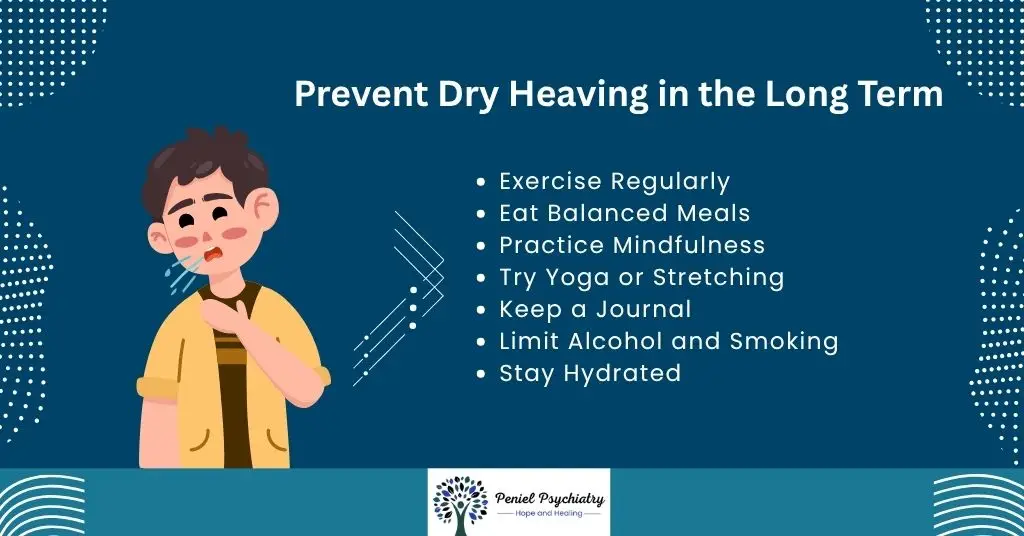
Stopping dry heaving from anxiety isn’t just about quick fixes. You can reduce the frequency of these occurrences by making simple changes to your daily life. Here’s what helps:
- Exercise Regularly: Engaging in physical activity helps lower anxiety and soothe a nervous stomach. Even a short walk can make a difference.
- Eat Balanced Meals: Avoid foods that upset your stomach, like caffeine, greasy, or spicy meals. Eating well keeps nausea away.
- Practice Mindfulness: Taking a few minutes each day to focus on your breath or body helps manage stress and reduce anxiety symptoms.
- Try Yoga or Stretching: These activities relax your muscles and lower tension that can trigger dry heaving.
- Keep a Journal: Writing down when you feel anxious and dry heaving helps you spot patterns and triggers.
- Limit Alcohol and Smoking: Both can irritate your stomach and make anxiety symptoms worse.
- Stay Hydrated: Drinking enough water helps your body stay balanced and can help reduce nausea.
Making these habits part of your routine helps your body handle stress more effectively and reduces the likelihood of dry heaving.
When Should You See a Doctor?
Dry heaving from anxiety is common, but sometimes it can signal a bigger problem. Knowing when to get medical help is essential for your health and peace of mind.
Signs to Watch For
- Dry heaving occurs frequently or lasts for a prolonged period.
- You lose weight without trying.
- You have severe stomach pain or blood in your vomit.
- You feel dizzy or very weak.
If you notice any of these symptoms, see a doctor as soon as possible.
How a Doctor Can Help
Doctors can determine if something else is causing your symptoms. They may suggest therapy, medicine, or lifestyle changes to manage your anxiety better. Book your appointment now for professional help to reduce dry, itchy skin and improve your overall well-being.
FAQs About Dry Heaving from Anxiety
Can anxiety cause dry heaving every day?
Yes, if anxiety is intense and ongoing, dry heaving can happen daily. Managing anxiety helps reduce how often it occurs.
How long does dry heaving from anxiety usually last?
It usually lasts a few minutes to an hour, but can come and go with anxiety episodes.
Is dry heaving dangerous if caused by anxiety?
Dry heaving itself isn’t dangerous, but can be uncomfortable. If symptoms persist for an extended period or cause additional issues, consult a doctor.
What can I do immediately to stop dry heaving?
Try deep breathing, sip water slowly, or use grounding exercises to calm your body quickly.
Can medication help with anxiety-related dry heaving?
Yes, sometimes doctors prescribe medication to manage anxiety, which can reduce dry heaving.
Final Tips to Cope with Dry Heaving from Anxiety
Dealing with dry heaving can be challenging, but adopting a few small habits can make a significant difference.
- Keep Mints or Ginger Chews Handy: These can soothe your throat and ease nausea.
- Know Your Triggers: Pay attention to what makes your anxiety worse and try to avoid those situations when possible.
- Stay Hydrated: Drinking enough water helps keep your stomach calm and reduces gag reflexes.
- Practice Relaxation Daily: Even a few minutes of deep breathing or gentle stretches can lower anxiety.
- Talk to Someone: Sharing your feelings with a friend or counselor can ease stress and stop dry heaving before it starts.
Remember, small steps every day add up to better control over anxiety and its symptoms.
Need Help Managing Anxiety and Dry Heaving?
If anxiety and dry heaving are affecting your daily life, you don’t have to face it alone. The team at Peniel Psychiatry understands what you’re going through and is here to help. Reach out today to get the support you need. Whether it’s therapy, advice, or a treatment plan, we can guide you toward feeling better.

